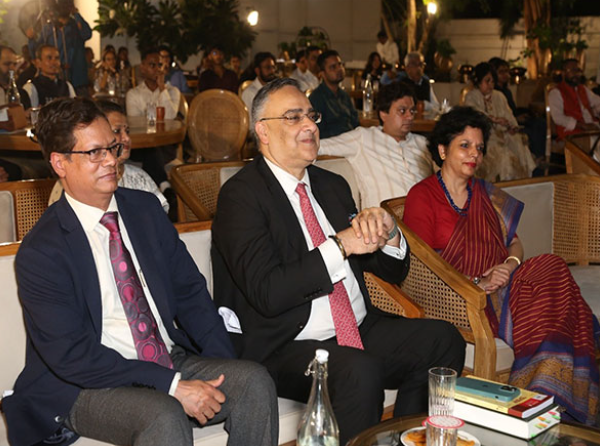New Delhi [India], October 1: The Mobius Foundation, in collaboration with the Environment Law & Development Foundation, successfully convened a significant panel discussion titled “Climate Liability, Justice, and Jurisprudence” on September 27, 2024, at Travancore House, New Delhi. The event addressed the urgent need for accountability and robust legal frameworks in response to escalating climate crises worldwide.
The esteemed panel featured prominent speakers, including:
- HMJ Hima Kohli, Former Judge, Supreme Court of India (Chief Guest).
- Dr Afroz Ahmad, Expert Member, National Green Tribunal (Guest of Honour).
- Chandra Bhushan, President & CEO, International Forum for Environment, Sustainability and Technology (Special Guest).
- Sanjay Upadhyay, Senior Advocate and Honorary Managing Trustee, ELD Foundation.
- Praveen Garg, IAS (Retd.), Former Special Secretary, MoEF&CC and President, Mobius Foundation.
The panel was expertly moderated by Jatinder Jay Cheema, a Projects, Energy, and Natural Resources lawyer.
Key Discussion Highlights:
The panel critically examined the intersections of climate change liability and legal frameworks, focusing on the following key themes:
1. Climate Liability: Exploring accountability mechanisms for governments, NGOs, corporations, and individuals in the Indian context.
2. Climate Justice: Discussing the disproportionate impacts of climate change on vulnerable and marginalized communities.
3. Evolving Jurisprudence: Reviewing landmark cases and innovative judicial approaches in climate litigation within the Indian legal system.

Speaker Insights:
HMJ Hima Kohli emphasized the urgency of addressing climate change, stating, “The increasing frequency of extreme weather events, melting glaciers, rising sea levels, and the loss of biodiversity underscore the crisis we face. It is imperative that we, as a society, recognize the multifaceted nature of this challenge. The solutions must integrate legal and political frameworks alongside scientific advancements, ensuring that every stakeholder is held accountable for their role in combating climate change.”
Dr Afroz Ahmad highlighted the staggering impact of fly ash, stating, “Globally, around 800 million tons of fly ash are generated, with India contributing approximately 180 million tons. This not only poses environmental hazards but also highlights the pressing need for stringent regulatory measures and innovative solutions. We must focus on sustainable practices that not only mitigate this waste but also harness its potential in a manner that benefits society.”
Chandra Bhushan stressed the need to navigate the complex relationship between environmental conservation and community displacement. He remarked, “The pursuit of sustainability often leads to conflicts, particularly for marginalized communities. We must recognize that our environmental policies must be inclusive, addressing the rights and needs of those who are most affected. True sustainability requires a holistic approach that balances ecological preservation with social justice.”
Sanjay Upadhyay called for the integration of climate liability into Indian law, advocating for a comprehensive legal framework grounded in sound principles. He stated, “We need to approach climate liability with a sense of urgency and responsibility. It is crucial that our legal frameworks reflect the realities of climate change, ensuring justice for those affected. An overarching law is essential, and it must be informed by both legal expertise and practical considerations, ensuring that we are prepared for future challenges.”
Praveen Garg said, we should strive to build a future wherein no community bears a disproportionate burden of the climate crisis, the future where the dignity and rights of all people are protected and where we live in harmony with ecosystems which sustain us.
The approach should be to have an overarching but well-thought-out law on climate change. There is a need to shift of population that is sitting on small agricultural land holdings, which can be brought about by quality education and skill development in emerging sectors.
In conclusion, the Mobius Foundation and the Environment Law & Development Foundation invited all stakeholders to continue engaging in discussions around climate liability and justice, emphasizing the importance of youth involvement in this critical dialogue.
For more information about the event and future initiatives, please contact: info@mobiusf.org
Mobius Foundation
Disclaimer: While we strive to ensure the accuracy and reliability of the information provided on this website, we do not guarantee its completeness, accuracy, or reliability. The views and opinions expressed in the articles are those of the authors and do not necessarily reflect the official policy or position of www.newsproject.in. Readers are encouraged to verify the information independently before acting on it.

